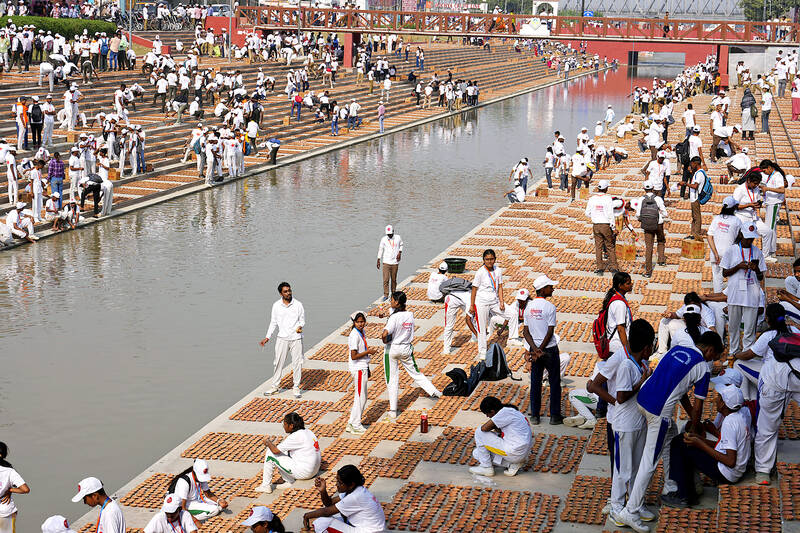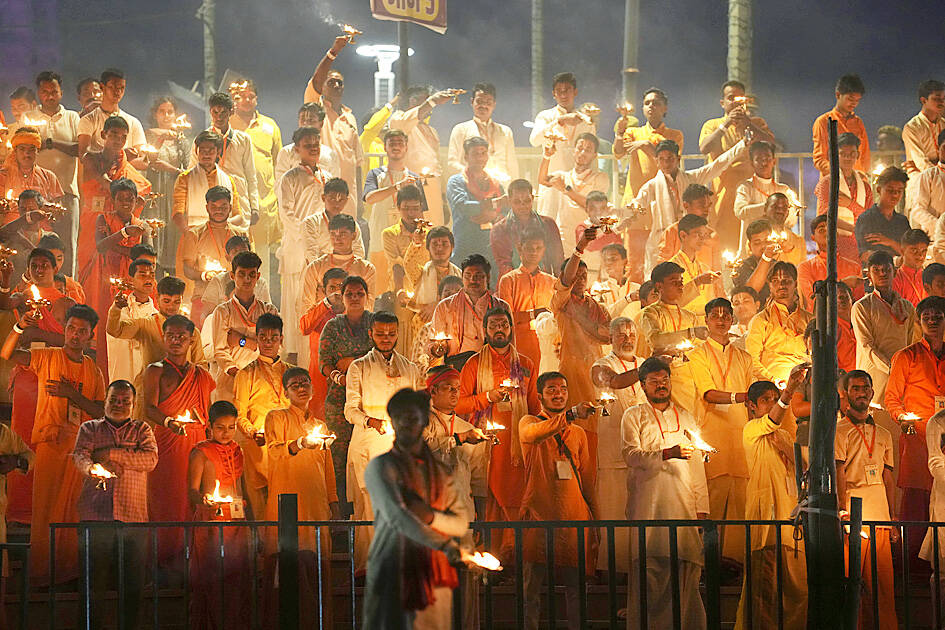A priest stands with folded hands praying toward the rising sun on the banks of the Saryu River in Ayodhya in the northern Indian state of Uttar Pradesh.
It was early on Wednesday, the day before Diwali, the biggest of the Hindu festivals.
Nearby, a group of women take a dip in the river dressed in their saris, while a barber trims the mustache of a shirtless man on the bank.

Photo: AP
Similar scenes have played out at this spot for hundreds of years. Ayodhya is an ancient city that Hindus believe was the birthplace of their deity Lord Rama.
According to the Hindu epic Ramayana, when Rama retuned home to Ayodhya after 14 years in exile with his wife, Sita, and brother Laxmana, its citizens lit lamps to welcome them.
Diwali, which means an array of lights, celebrates Rama’s homecoming. It also symbolizes the victory of good over evil.

Photo: AP
Millions of Hindus across the country light their homes with oil lamps or festive electric lights on the new-moon day. They distribute sweets, burst firecrackers, and shop for gold and household appliances during the five-day festivities, with Diwali on the third day.
What was once a private celebration with family and friends is increasingly public and it is nowhere more evident than in Ayodhya.
Since 2017, the Uttar Pradesh government has organized Deepotsav, a celebration that includes drones and laser lights, on the eve of Diwali in Ayodhya.
Last year, 2.2 million oil lamps were lit on the banks of the Saryu River, setting a Guinness World Record. This year, the state broke its own record by lighting 2.51 million lamps.
Actors playing Rama, Sita and Laxmana were brought in by helicopter. They stood on a carpeted open area while Yogi Adityanath, the state’s chief minister, and other senior officials offered prayers. During the ceremony, another helicopter showered flower petals on the attendees.
People watched a laser show as they stood among the rows of burning oil lamps, recording the experience on their phones.
Diwali’s main festival celebrations were held across the country yesterday.

A fire caused by a burst gas pipe yesterday spread to several homes and sent a fireball soaring into the sky outside Malaysia’s largest city, injuring more than 100 people. The towering inferno near a gas station in Putra Heights outside Kuala Lumpur was visible for kilometers and lasted for several hours. It happened during a public holiday as Muslims, who are the majority in Malaysia, celebrate the second day of Eid al-Fitr. National oil company Petronas said the fire started at one of its gas pipelines at 8:10am and the affected pipeline was later isolated. Disaster management officials said shutting the

US Vice President J.D. Vance on Friday accused Denmark of not having done enough to protect Greenland, when he visited the strategically placed and resource-rich Danish territory coveted by US President Donald Trump. Vance made his comment during a trip to the Pituffik Space Base in northwestern Greenland, a visit viewed by Copenhagen and Nuuk as a provocation. “Our message to Denmark is very simple: You have not done a good job by the people of Greenland,” Vance told a news conference. “You have under-invested in the people of Greenland, and you have under-invested in the security architecture of this

UNREST: The authorities in Turkey arrested 13 Turkish journalists in five days, deported a BBC correspondent and on Thursday arrested a reporter from Sweden Waving flags and chanting slogans, many hundreds of thousands of anti-government demonstrators on Saturday rallied in Istanbul, Turkey, in defence of democracy after the arrest of Istanbul Mayor Ekrem Imamoglu which sparked Turkey’s worst street unrest in more than a decade. Under a cloudless blue sky, vast crowds gathered in Maltepe on the Asian side of Turkey’s biggest city on the eve of the Eid al-Fitr celebration which started yesterday, marking the end of Ramadan. Ozgur Ozel, chairman of the main opposition Republican People’s Party (CHP), which organized the rally, said there were 2.2 million people in the crowd, but

JOINT EFFORTS: The three countries have been strengthening an alliance and pressing efforts to bolster deterrence against Beijing’s assertiveness in the South China Sea The US, Japan and the Philippines on Friday staged joint naval drills to boost crisis readiness off a disputed South China Sea shoal as a Chinese military ship kept watch from a distance. The Chinese frigate attempted to get closer to the waters, where the warships and aircraft from the three allied countries were undertaking maneuvers off the Scarborough Shoal — also known as Huangyan Island (黃岩島) and claimed by Taiwan and China — in an unsettling moment but it was warned by a Philippine frigate by radio and kept away. “There was a time when they attempted to maneuver